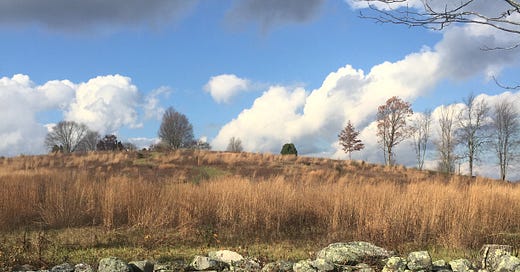between/the ground and the feast is where I live now
On sustenance when the world wants to fight
A few weeks ago, I was at my local middle school, standing on line and waiting to check in with the poll workers in order to vote in our elections. The workers are, for the most part, retired teachers and grandparents; people who are a little older, and who have seen it all. A few people ahead of me was a man about my age, in his fifties, waiting impatiently for two women I recognized from the local Episcopal church holiday fair to locate his name. His time was extremely precious, apparently, and when they wanted to send him over to another line, he told these two nice older church ladies to do something to themselves that is physically impossible. And then he stormed out of the school gymnasium. The rest of us on the line gaped at each other, wide-eyed and wary. After all, this is Newtown, and the Sandy Hook school is, or rather, was, less than two miles away from where I was standing, and unthinkable violence runs through our community like a vein. But these days, wherever and whoever we are, the potential for dangerous, entitled fury— physical, emotional, psychological — hangs everywhere like heavy old velvet drapery.
I have a pronounced allergy to rage and, in particular, drama, which makes my throat close up and my body shut down as though I’m going into a sort of anaphylaxis of the mind and spirit.
This is how things have been going lately, pretty much everywhere. People are now enraged as a rule; we are ready to fight at the drop of a hat. The mundane tipping points: being cut off in traffic, getting the wrong order in a restaurant, having to wait on line for something for five minutes, discovering that someone you love and have known for years doesn’t vote the way you do, someone’s yoga mat accidentally touching yours. I grew up in a chronically angry household — my parents were at each other on a daily basis from the time the sun came up, searching for the best and most strategic ways to hurt each other, and I absorbed a lot of that toxic discontent like a sponge. So I have a pronounced allergy to rage and, in particular, drama, which makes my throat close up and my body shut down as though I’m going into a sort of anaphylaxis of the mind and spirit: I just can’t do it, I’m not wired for it, and when approached by it (which I often am, as a writer who is somewhat in the public eye), I flee. I have spent much of my life attracting people with a peculiar fondness for acrimony, who are somehow nurtured and sustained by backing their friends and family up against a wall, and putting them on the defense; I recently decided to examine this, to ask why — the short answer is because it is the language that my cells speak and recognize — and then to say No, it doesn’t have to be this way. And it doesn’t. I used to think that this attitude just had to do with my exposure to social media memes, but that’s not the case; the way we think and live in the world can change thanks to plasticity, as described by neuroscientist Richard Davidson, who I once saw speak quantitatively about neuroplasticity and meditation with Joseph Goldstein, Jon Kabat-Zinn, and Daniel Goleman.
When one’s surroundings, acquaintances, and culture are locked in this chronic and deep condition of fracture — Krista Tippett describes it as a metastases: the incredible toxicity and polarization is that it is pain and fear on the loose, pain and fear metastasizes —- one is then faced with this social fracture every day, in every conceivable situation from the drive-thru at Starbucks to the office cubicle to (certainly) social media to friendships. I am now on my fourth re-read of my friend Katherine May’s Wintering —- a life-changing book for me about the power and necessity of going inward during dark times —- and some of the takeaways are the questions that I now ask myself in virtually every situation: what is it that truly nurtures my heart? What is it that breaks it? And why am I prone to allowing in so much of the latter, or is it just part of an ongoing cycle?
What is it that truly nurtures my heart? What is it that breaks it? And why am I prone to allowing in so much of the latter, or is it just part of an ongoing cycle?
Having come to this realization -— the one that says that not accepting bad behavior and put-up-your-dukesism doesn’t make me an outlier (although it is often isolating) but instead engaged in a kind of late-onset tenderness for my own heart — I now find myself separated from much of what I know, or knew, to be the current universal human condition of bitterness; I’ve been canceled by it repeatedly at both the most public and private levels. I’m living now, to quote Ada Limon, between the ground and the feast: the life-giving, anchoring place of foundation and also where we are buried—where we begin and we end—and sustenance itself.
From the archives






Everything you’ve said here echoes my own deep dives / creative work in the realms of trauma, compassion for self and others, living from the heart - and its risks. “Life is pain, princess.” I’m with you. Let’s meet the rage and sorrow with a kind heart, one who knows how to celebrate life while not denying reality. “I do believe in Fairies! 🧚 I do!”
Stay tender. ❤️🩹